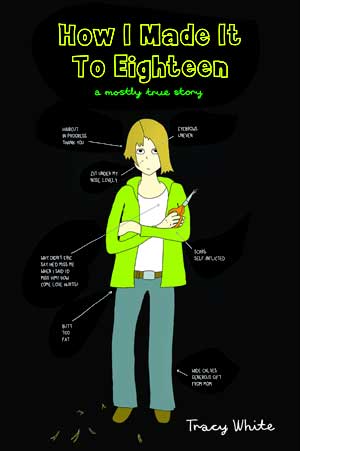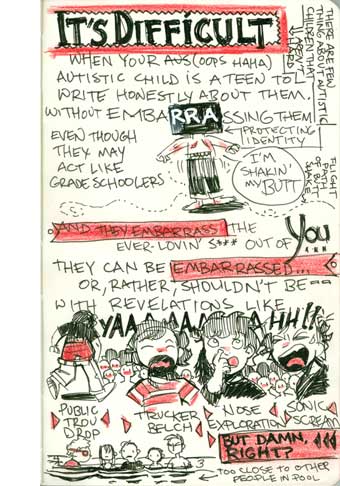“95% True”
Been reading and enjoying two very different autobiographical comics; Tracy White’s memoir GN How I Made It to Eighteen and Lea Hernadez’s Near-Life Experience entries at LJ.
White’s book delivers literally on the title, detailing her recovery from mid-teen traumas, and how treatment helped her to not die before becoming the successful and accomplished adult she is today. And like her webcomics at traced.com, How I Made It to Eighteen is “guaranteed 95% true.” She’s changed names and details, but you know you’re getting the facts that matter.
Hernandez’s NLEx also struggles with those 5% quandries, in her case because she’s not writing about events and friends from decades ago, she’s writing about stuff that happened Tuesday, and about a family that might be in the next room. You can feel the inner struggle as she writes about how much she’s willing to write about her son’s ongoing struggles to fit in to society’s limited expectations of him.
It’s a real open question whether any autobiography can ever be more than 95% true. Mark Twain stipulated that his memoir not be published until 100 years after his death (this year!), presumably so that he could be 100% honest—a full implementation of the Mystery Quote—but from what I’ve heard, the old guy doesn’t come across as particularly objective while ranting about his many late-in-life grudges.
Emotional honesty and factual accuracy aren’t the same thing after all. Twain may have thought he was hitting 100%, but maybe nobody can ever get past 95%. And maybe saying so upfront, as White and Hernandez both do in their own fashion, is the most honest way to start.
















I would hazard to guess that many writers are more honest in their fiction than in their memoirs: in their fiction, they can give voice to their less acceptable ideas, by putting them in someone else’s mouth. And does full honesty imply the ability to be honest with oneself? Because 95% seems really high. Most people I know (including myself) tell lies to themselves all the time.
If the author doesn’t treat emotional honesty as factual accuracy, knows that even he can’t totally grasp his own reality, and accept that he will inevitably make mistakes, forget, be confused or even lie, that’s the highest score in my book.
After all, we are, or at least I am, reading comics to see thought the eyes of another one, to see in a different perspective – not to obtain the “truth”, whatever it may be.
As I struggle with how to write about people who are still alive (and they NEED to be written about), I cam across one of your post “Mystery Quote,” and got exactly what I needed:
“What I am saying, I suppose, is that you write as if everyone is dead. Then you face the music. I don’t know any other way to keep the teeth sharp and the spirit alive.” — Lynn Freed
I prefer 90% because there’s more room for some soothing funny to leaven scathing, sad and shocking stories. If I can’t find genuine humor in something, I will darn well invent it and bin another 5% of true to get it in.
And now back to drawing Wolverine! (That is 100% true.)
Ooh! I wanna see Chibi Wolverine throw a tantrum cause he cut himself shaving!
Funny you should mention chibi Wolverine…